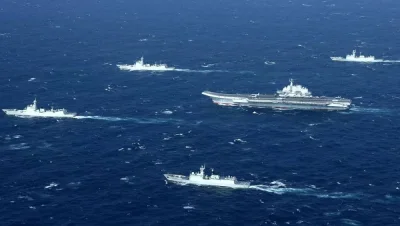Chinese President Xi Jinping, left, shaking hands with Sri Lanka’s President Mahinda Rajapakse during their bilateral meeting at the Presidential Secretariat in Colombo yesterday.
China’s President Xi Jinping yesterday announced increased “maritime security” co-operation with Sri Lanka whose Beijing-funded strategic port developments have caused unease in neighbouring India.
Xi said his proposal for a 21st Century Maritime Silk Road and his host President Mahinda Rajapakse’s vision to turn the Indian Ocean island into a regional shipping and aviation hub was “cut out for one another.”
Both believed they should realise the benefits of the silk road plan, an initiative to secure trade routes through economic diplomacy, by “deepening” their cooperation, Xi said after talks with Rajapakse at his sea-front office in the capital.
He pledged to strengthen cooperation in “areas such as port construction and development, development and construction of coastal industrial parks, maritime economy and maritime security.”
China is increasingly asserting its influence in Sri Lanka, a midway point on one of the world’s busiest international shipping lanes.
It is already the largest investor in the island nation, having financed the construction of a deep-sea port and an international airport.
Before leaving today for India, the final leg of a three-nation South Asian tour that has already taken him to the Maldives, Xi is due to kick off building work on another Beijing-funded $1.4bn port city in Colombo.
Yesterday, he along with President Rajapakse launched Sri Lanka’s biggest electricity generator, a Chinese-funded 900-megawatt coal power plant located less than 200kms (125 miles) from India.
Soon after connecting the Chinese power plant to the national grid, Rajapakse, who called China “a sincere and a trusted friend who has assisted Sri Lanka at all times” announced slashing domestic electricity tariffs by 25%.
He also reduced fuel prices by about 3%.
In a letter published on the front page of Sri Lanka’s state-run Daily News ahead of his visit yesterday, Xi said he wants to “enhance exchanges and cooperation between us in maritime, business, infrastructure, defence, tourism and other areas”.
The reference to defence came despite the repeated insistence of Sri Lankan officials that relations were based on commercial rather than security considerations, an apparent attempt to allay Indian fears.
Sri Lanka and China yesterday entered 27 agreements, including one for starting negotiations on a free trade pact.
Some officials in New Delhi have voiced fears in the past that China’s growing engagement in the region is a deliberate strategy to encircle India.
A military aircraft maintenance facility which Sri Lanka sought to establish with Chinese help has been in limbo since India privately objected to its chosen venue, the eastern port district of Trincomalee.
Trincomalee is a natural deep-sea harbour which allied forces used as a staging post during World War II. It is still considered strategically important.
Xi also said no country should be allowed to intervene in the affairs of the small island nation, which has historically come under India’s influence.
“China... resolutely opposes any move by any country to interfere in Sri Lanka’s internal affairs under any excuse,” Xi said
Beijing has consistently supported Colombo in its efforts to resist a UN investigation into alleged war crimes against Tamil Tiger rebels, while India has pushed Sri Lanka to ensure accountability.
Beijing has already financed the construction of Sri Lanka’s second international airport and a deep sea port in the southern district of Hambantota, the home constituency of President Rajapakse.
The ambitious port city project being developed by the Sri Lanka Ports Authority with Chinese backing will include a luxury marina and a Formula One race track.
China also faces competition for influence in the region from Japan whose Prime Minister Shinzo Abe travelled to Sri Lanka earlier this month and secured an agreement on forging stronger maritime links.
India’s new Prime Minister Narendra Modi, meanwhile, has embarked on a regional charm offensive since taking office in May to restore relationships which critics say the previous government neglected.



